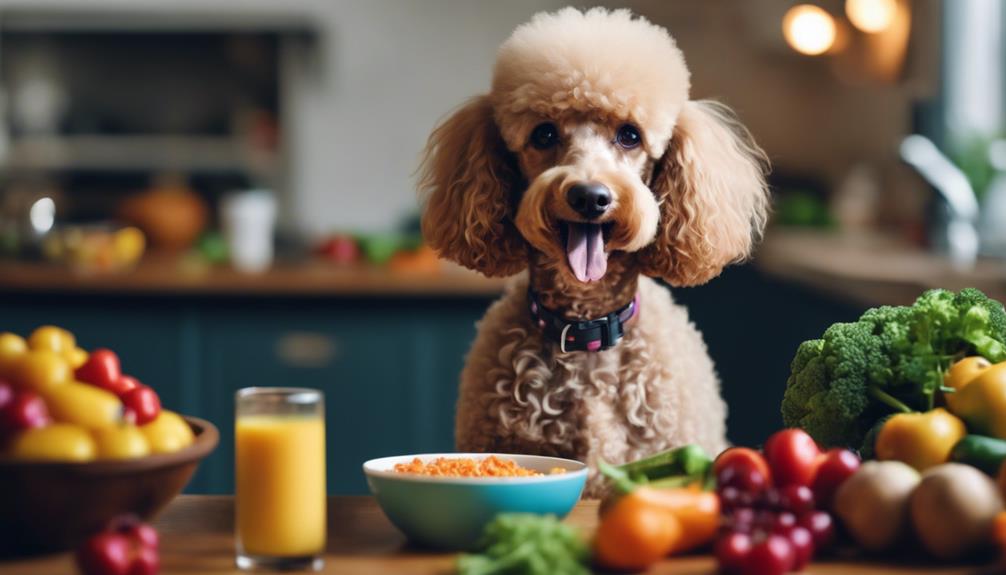If your poodle, Max, has been experiencing recurrent episodes of diarrhea despite multiple diet changes, you might be wondering about the underlying causes. Understanding the intricate balance between diet and digestion is crucial in maintaining your poodle's gastrointestinal health. By exploring the impact of specific dietary components and digestion processes, you can make informed decisions to support your poodle's well-being.
Key Takeaways
- Prioritize balanced diets rich in whole meats, vegetables, and nutrients for optimal GI health in Poodles.
- Incorporate fiber and probiotics to support digestion, nutrient absorption, and gut microbiota diversity.
- Avoid trigger foods like wheat, corn, soy, and dairy to prevent adverse reactions and maintain digestive wellness.
- Monitor hydration, adjust portions based on size and activity level, and include high-quality ingredients for overall digestive system support.
Poodle Diet Recommendations for GI Health
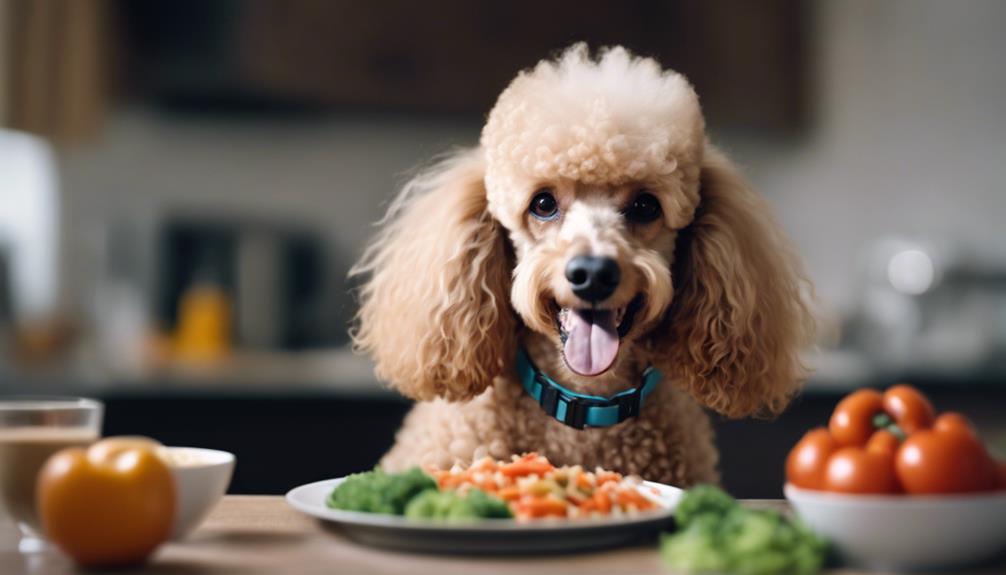
For optimal gastrointestinal health in Poodles, prioritize diets rich in whole meats, vegetables, and balanced nutrients. Your Poodle's gut health is intricately linked to the diet it consumes. A diet consisting of high-quality whole meats provides essential proteins for muscle health and overall well-being. Vegetables offer vital vitamins, minerals, and fiber that aid in digestion and support a healthy gut. Balanced nutrients, including carbohydrates and fats, are crucial for energy and proper bodily functions in your Poodle.
Incorporating probiotics into your Poodle's diet can significantly enhance gut health by promoting the growth of beneficial bacteria. These probiotics aid in digestion and improve nutrient absorption, ensuring your Poodle receives the maximum benefit from its food. By avoiding table scraps and providing fresh water, you can further support your Poodle's gastrointestinal well-being. Remember, your Poodle's diet plays a fundamental role in its overall health, so choose wisely to promote optimal gut health and prevent common gastrointestinal issues.
Common Gastrointestinal Issues in Poodles
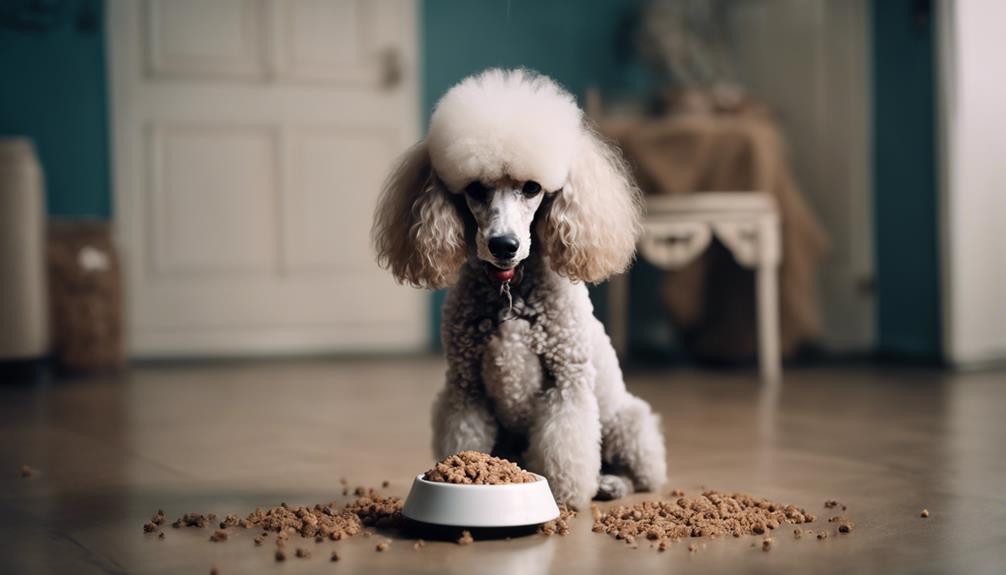
Poodles commonly experience a range of gastrointestinal issues, including gastritis, pancreatitis, IBD, food allergies, and intestinal parasites, which can manifest through symptoms like vomiting, diarrhea, abdominal pain, weight loss, and gas. These issues can stem from various factors such as food intolerances, infections, or inflammatory responses. Poodles are particularly prone to developing chronic inflammation and digestive disorders, underscoring the importance of maintaining gut health through a high-quality diet rich in nutritional value. Addressing food allergies promptly and ensuring a balanced diet tailored to your Poodle's needs can significantly reduce the risk of gastrointestinal problems. Regular veterinary check-ups are crucial for early detection and management of these issues, as they can provide guidance on dietary adjustments and potential treatments. By staying vigilant and proactive in monitoring your Poodle's digestive health, you can help mitigate the impact of common gastrointestinal issues and ensure a happy, healthy companion.
Importance of Fiber in Poodle Diet
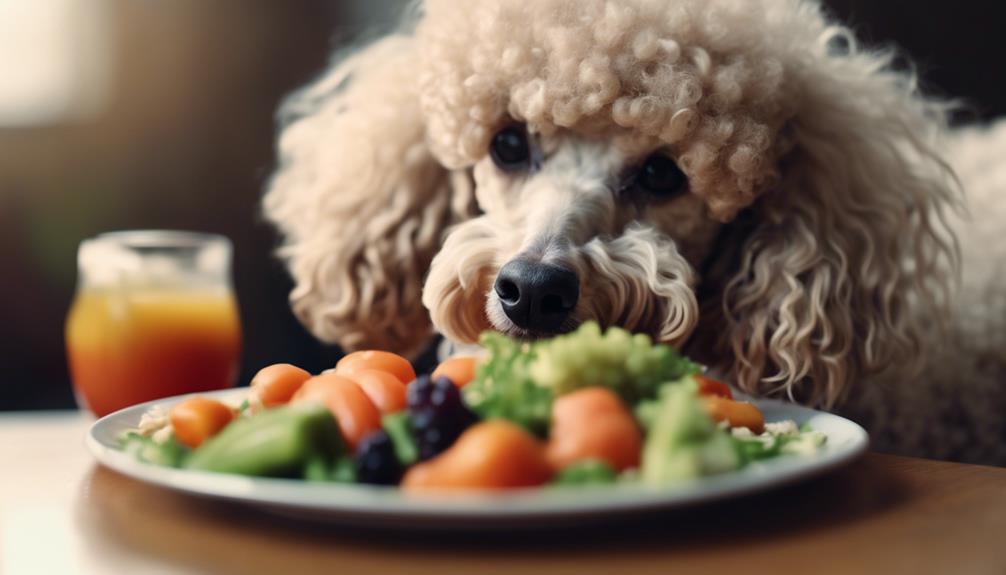
In the realm of Poodle nutrition, prioritizing fiber intake stands as a key pillar for ensuring optimal digestive health. When it comes to your Poodle's diet, incorporating sufficient fiber is essential for maintaining healthy digestion. Here's why fiber is crucial for your Poodle's well-being:
- Promoting Healthy Digestion: Fiber plays a crucial role in supporting healthy digestion in Poodles by aiding in the smooth passage of food through the digestive tract.
- Regulating Bowel Movements: Adequate fiber intake helps regulate bowel movements, preventing issues such as constipation and diarrhea, which are common concerns for Poodles.
- Supporting Gut Bacteria: Fiber-rich foods contribute to the growth of beneficial gut bacteria in your Poodle's digestive system, promoting overall gastrointestinal health.
Role of Probiotics in Poodle Digestion
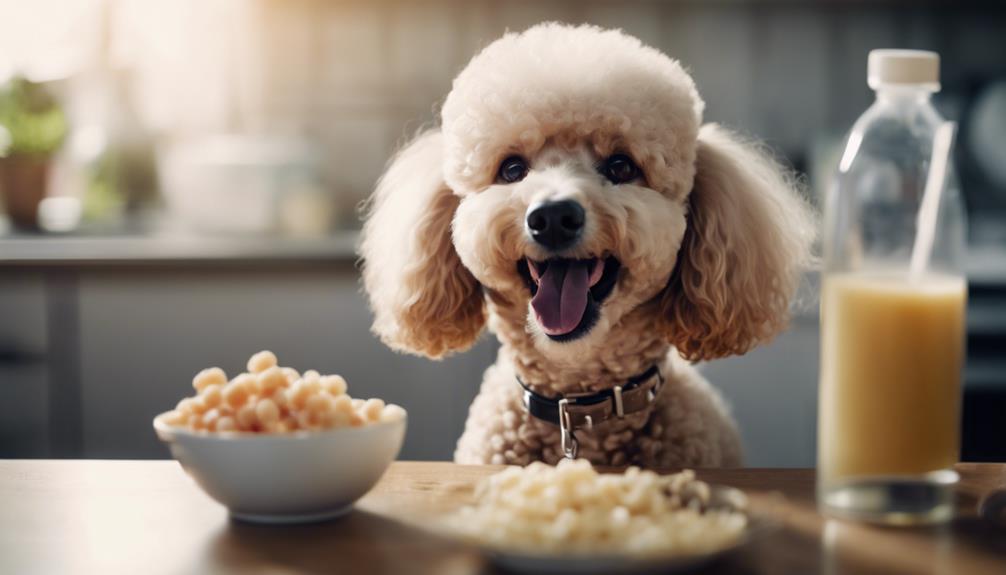
To enhance your Poodle's digestive health, incorporating probiotics into their diet can play a significant role in maintaining a balanced gut environment. Probiotics, which are beneficial bacteria, help regulate digestion, enhance nutrient absorption, and boost the immune system. By reducing gastrointestinal issues such as diarrhea, gas, and bloating, probiotics contribute to a healthier gut balance in Poodles. These live microorganisms have shown promise in alleviating symptoms of inflammatory bowel disease, making them a valuable addition to your pet's diet. Whether provided as supplements or through fermented foods, probiotics can improve overall digestive health in Poodles. By promoting a diverse and beneficial gut microbiota, probiotics support the breakdown of food, absorption of essential nutrients, and the prevention of harmful pathogens from thriving in the digestive tract. Incorporating probiotics into your Poodle's diet can help maintain a healthy and well-functioning gastrointestinal system, ensuring their well-being and vitality.
Avoiding Trigger Foods for Poodles
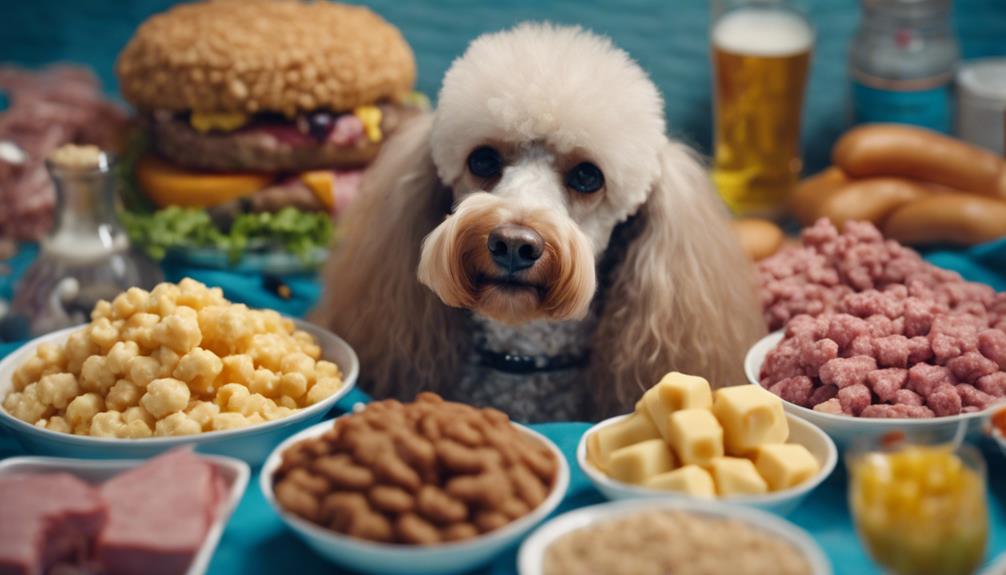
Identifying trigger foods like wheat, corn, soy, and dairy is crucial for your Poodle's digestive health. Adjusting their diet to exclude these allergens can prevent issues like vomiting, diarrhea, and skin irritations. Monitor your Poodle's response to these dietary changes closely to ensure optimal gastrointestinal well-being.
Trigger Food Identification
When monitoring your Poodle's gastrointestinal health, it is crucial to identify trigger foods that may cause digestive issues such as vomiting, diarrhea, and gas. Here are three key steps to help you pinpoint these trigger foods effectively:
- Track Symptoms: Keep a detailed food diary to monitor how your Poodle reacts to different ingredients.
- Consult a Professional: Work closely with your veterinarian to conduct food trials and determine which foods may be causing digestive problems.
- Eliminate Potential Triggers: Remove common culprits like grains, artificial additives, and low-quality meat by-products from your Poodle's diet to see if symptoms improve.
Dietary Adjustments for Poodles
Begin by carefully selecting and eliminating trigger foods from your Poodle's diet to support their gastrointestinal health and overall well-being. Certain foods like dairy, grains, soy, and artificial additives can disrupt your dog's gut health. Opt for a diet rich in natural, easily digestible ingredients and avoid common allergens such as chicken, beef, and wheat. Steer clear of high-fat, spicy, and sugary items that may cause digestive distress. Poodles with sensitive stomachs may benefit from a limited ingredient diet to pinpoint and remove trigger foods. Choosing dog food with single-source protein options can aid in maintaining a healthy gut and optimal digestion for your furry companion. Prioritizing your Poodle's dietary needs is key to ensuring their digestive system functions at its best.
Monitoring Digestive Response
To effectively manage your Poodle's gastrointestinal health, closely monitor their digestive response by keeping a detailed food diary. This will help in identifying trigger foods that may be causing digestive disturbances. Pay attention to signs like vomiting, diarrhea, gas, or bloating after meals to pinpoint problematic ingredients. Slowly introduce new foods and monitor your Poodle's reaction to prevent gut health issues. Common trigger foods for Poodles include dairy, grains, certain proteins, and artificial additives. It's essential to consult with a vet to create a tailored diet plan that avoids these trigger foods and supports your Poodle's digestive well-being. By monitoring their reaction and adjusting their diet accordingly, you can ensure your furry companion maintains optimal gut health.
Hydration Tips for Poodle GI Health
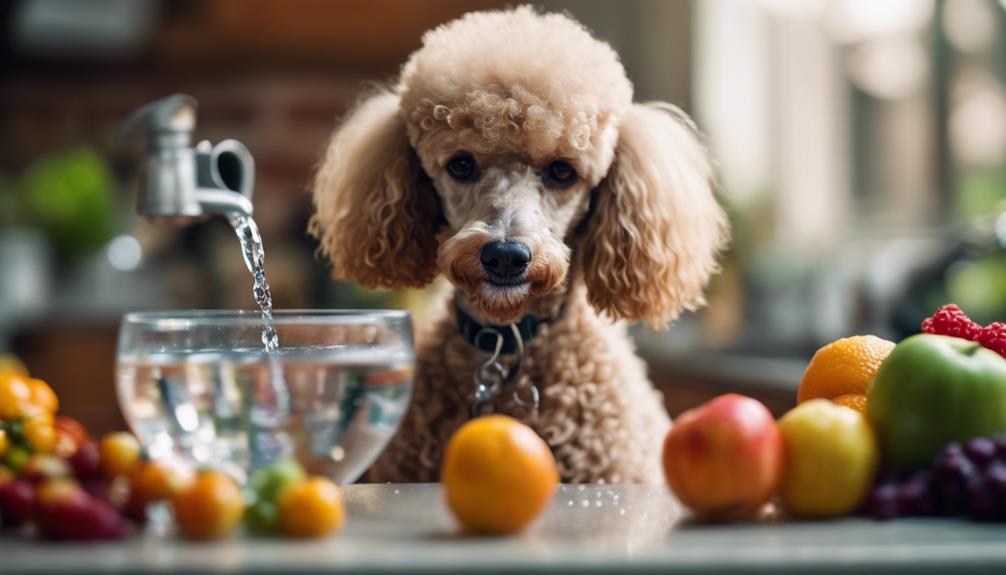
For optimal gastrointestinal health in Poodles, ensuring consistent access to fresh, clean water is paramount. Proper hydration plays a vital role in supporting digestion, nutrient absorption, and overall well-being in your furry companion. Here are some hydration tips to help maintain your Poodle's GI health:
| Hydration Tips | Description |
|---|---|
| 1. Monitor Water Intake | Keep track of how much water your Poodle drinks daily to ensure adequate hydration. |
| 2. Provide Fresh Water | Make sure your Poodle has access to clean water at all times to support digestion. |
| 3. Encourage Regular Hydration | Motivate your Poodle to drink water throughout the day to prevent dehydration. |
| 4. Use Hydration Sources | Consider wet dog food or water-rich fruits and vegetables to boost water intake. |
| 5. Watch for Dehydration Signs | Be vigilant for symptoms like dry gums, lethargy, or decreased urination which indicate dehydration. |
Maintaining a Balanced Poodle Diet
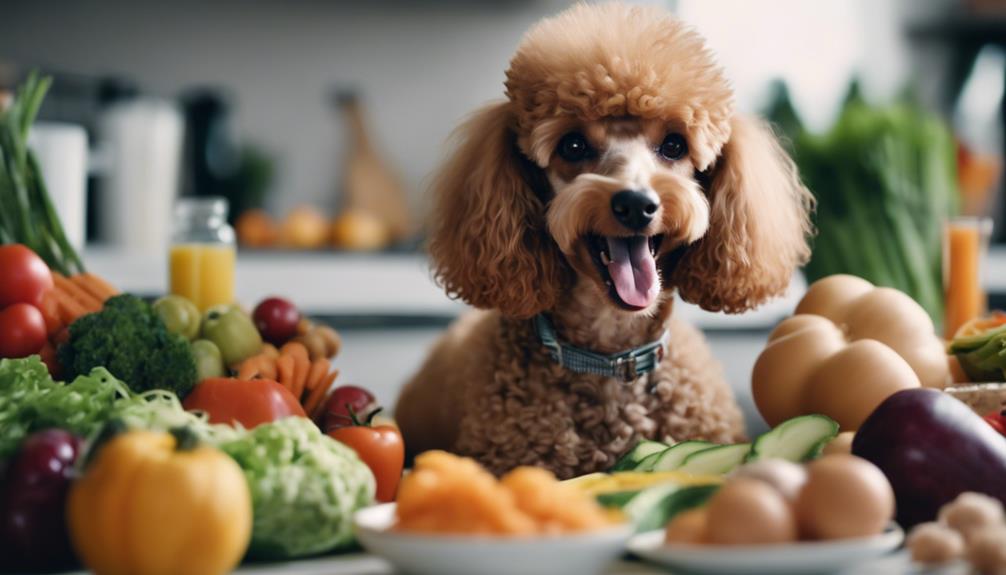
To maintain a balanced Poodle diet, focus on providing proper food portions, incorporating nutrient-rich ingredients, and supporting your Poodle's digestive system. Ensuring that your Poodle receives a variety of high-quality whole foods will help promote optimal gut health. Remember that monitoring portion sizes and feeding schedules is crucial in managing your Poodle's gastrointestinal well-being.
Proper Food Portions
Properly measuring and adjusting food portions is essential for maintaining a balanced diet that promotes optimal gastrointestinal health in Poodles. Here are some critical points to consider:
- Tailored Portions: Food portions should be customized based on your Poodle's size, activity level, age, and overall health condition.
- Avoid Overfeeding: Overfeeding can lead to obesity and digestive issues, impacting your Poodle's gut health negatively.
- Consult a Professional: It's crucial to consult a veterinarian to determine the ideal portion size for your dog, ensuring they receive the right nutrition without overeating.
Nutrient-Rich Ingredients
Utilize nutrient-rich ingredients to ensure a balanced diet that supports optimal health in Poodles. High-quality proteins like chicken, beef, and fish provide essential amino acids, while fiber-rich foods such as sweet potatoes, peas, and pumpkin promote digestion and gut health. Healthy fats sourced from salmon oil and coconut oil contribute to a shiny coat and overall well-being. Antioxidant-rich ingredients like blueberries, spinach, and carrots can enhance immune function and combat free radicals. By incorporating these elements into your poodle's diet, you are fostering a healthy digestive system and providing the necessary nutrients for their well-being.
| Nutrient-Rich Ingredients | Benefits | Examples |
|---|---|---|
| High-quality Proteins | Essential amino acids | Chicken, Beef, Fish |
| Fiber-Rich Foods | Supports digestion | Sweet Potatoes, Peas |
| Healthy Fats | Shiny coat, well-being | Salmon Oil, Coconut Oil |
| Antioxidant-Rich Ingredients | Boosts immune function | Blueberries, Spinach |
Digestive System Support
Incorporating real, whole-food ingredients rich in dietary fiber, probiotics, and prebiotics is essential for supporting the digestive system health of Poodles. Here are three key ways to maintain a balanced Poodle diet for optimal digestive system support:
- Dietary Fiber: Fruits, vegetables, and whole grains help maintain a healthy gut in Poodles.
- Probiotics and Prebiotics: These are crucial for supporting the gut microbiota and overall digestive health in Poodles.
- Hydration: Adequate water intake is essential for optimal gut health, aiding in digestion and nutrient absorption.
Frequently Asked Questions
What Is the Best Diet for Dogs With Gastrointestinal Issues?
For dogs with gastrointestinal issues, consider a diet with probiotic supplements, low-fat options, limited ingredients, grain-free choices, homemade recipes, and digestive enzymes. Follow veterinarian recommendations to ensure your pup's digestive health.
Are Poodles Prone to Digestive Issues?
Yes, Poodles are prone to digestive issues due to their specific sensitivities. Consider incorporating digestive enzyme supplements, probiotics, fiber-rich options, allergen avoidance, and hydration in their diet. Homemade recipes can also cater to their needs effectively.
What Foods Help a Dogs Gut Health?
To keep your dog's gut healthy, focus on probiotic supplements, high fiber snacks, digestive enzymes, lean proteins, prebiotic foods, limited ingredients, and grain-free options. These choices support digestion and overall well-being for your furry friend.
What Are Signs of Poor Gut Health in Dogs?
If your dog shows signs of poor gut health, like vomiting, diarrhea, bloating, or excessive gas, it's crucial to act promptly. Watch for lethargy, changes in appetite, stool, weight, and bad breath, as they may signal underlying digestive issues.
Conclusion
In the intricate symphony of poodle gastrointestinal health, proper nutrition and digestion are the conductors orchestrating harmony. Just as a skilled chef crafts a masterpiece dish with precision and care, poodle owners must curate balanced diets to ensure their furry companions thrive. By nourishing their delicate digestive systems with high-quality ingredients and mindful choices, poodles can dance through life with vitality and vigor, leaving gastrointestinal issues behind like a fading melody.
